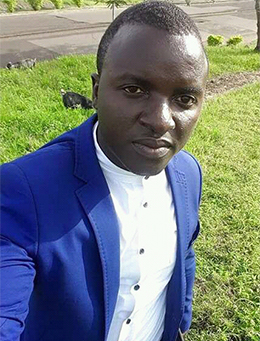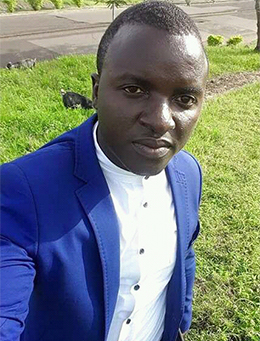Police arrested Atia Tilarious Azohnwi, the political editor of The Sun, and Amos Fofung, a bureau chief at The Guardian Post, on February 9, 2017, in Buea, the capital of Cameroon’s English-speaking Southwest region, according to media reports. Their arrest came a few hours after police detained a third Cameroonian, Mofor Ndong, for allegedly planning to distribute pamphlets for a banned organization, according to The Sun newspaper.
All three were held under Cameroon’s anti-terror act, which allows authorities to hold detainees indefinitely without charge.

Police arrested Azohnwi and Fofung when officers arrived to search the latter’s house as part of their investigation into Ndong, who had been staying there, The Sun reported. Police were monitoring Ndong because of an intelligence report that alleged he planned to distribute pamphlets for the Southern Cameroons National Council–a political organization banned in January by authorities–according to a statement by The Sun and news reports.
Ndong, the Bamenda-based publisher of the Voice of the Voiceless who had arrived in Buea the previous day, admitted possession of the pamphlets, The Sun reported.
On February 10, 2017, all three were transferred to the judicial police headquarters in the Southwest region, where police handcuffed and transported them to Yaoundé in a pick-up vehicle, Fofung told CPJ. Fofung, who was released without charge on August 5, 2017, added that more than six armed and masked police officers accompanied the journalists.
Azohnwi was arrested on initial charges of terrorism, insurrection, rebellion, subversion, revolution, secession, and inciting the population against the state, a person familiar with his case, who asked not to be named for fear of reprisal, told CPJ. On July 14, 2017, a military court charged him with promotion of terrorism, according to reports. CPJ could not determine if the military prosecutor has formally charged Ndong.
A journalist from The Guardian Post, who asked to remain anonymous for fear of reprisal, said that although Azohnwi and Fofung’s arrests were initially related to Ndong’s, he believes that authorities were retaliating against the pair for their critical journalism. Fofung wrote articles in The Guardian Post that the authorities “did not find friendly,” he said.
One of Azohnwi’s relatives, who did not want to be named for fear of reprisal, told CPJ, “Atia was arrested because he is a journalist. He is also accused of having links with members of the outlawed Cameroon Anglophone Civil Society Consortium.”
Fofung told CPJ that after Ndong and Atia were taken to court without him on July 14, 2017, he was told that he should have been released nearly five months earlier. “The president of the military tribunal told them that I ought to have been released since April 5, the same day we were transferred to prison. To her, I was a ‘ghost in prison’,” Fofung said. He said it took his family and lawyers an additional three weeks to secure his release.
According to The Sun’s statement, when the paper’s managing editor Wasso Norbert Binde and editor Elah Geoffrey Mbong travelled to Buea to demand that authorities release the journalists on February 10, 2017, Ndong told them he had been assaulted by police, The Sun reported. He had a punctured lip and injuries to his feet, according to the paper’s statement.
Cameroon’s president’s office and the official government spokesperson did not immediately respond to CPJ’s request for comment.
The day after their arrest, Azohnwi, Ndong and Fofung were transferred to the headquarters of the judicial police in Yaoundé, where they were detained for 55 days, said Fofung.
Fofung told CPJ that after they were moved to Yaoundé, authorities denied them access to any communication or visits for two weeks. “While at the police headquarters, we were taken to court twice and brought back without anyone asking us any question. On one occasion the policemen who accompanied us told us that the military prosecutor who we ought to meet had gone for sports. So we were taken back to the police headquarters,” Fofung added.
The February 9, 2017 arrest was the second time in less than three weeks that police detained Azohnwi. Police detained him briefly while he was distributing copies of The Sun in Buea, his paper reported.
In December 2016, Bernard Okalia Bilai, the governor of the region, threatened to have Azohnwi arrested after he and two other journalists tried to start the Consortium of Journalism Associations in the Southwest region, according to reports. The governor ordered the journalists to shut down the consortium, after it released a statement calling for a boycott of official government events if press releases and other documents were not in English.
Bilai did not immediately respond to CPJ’s request for comment.
